What’s the Best SD‑WAN Vendor for Virgin Media Business?
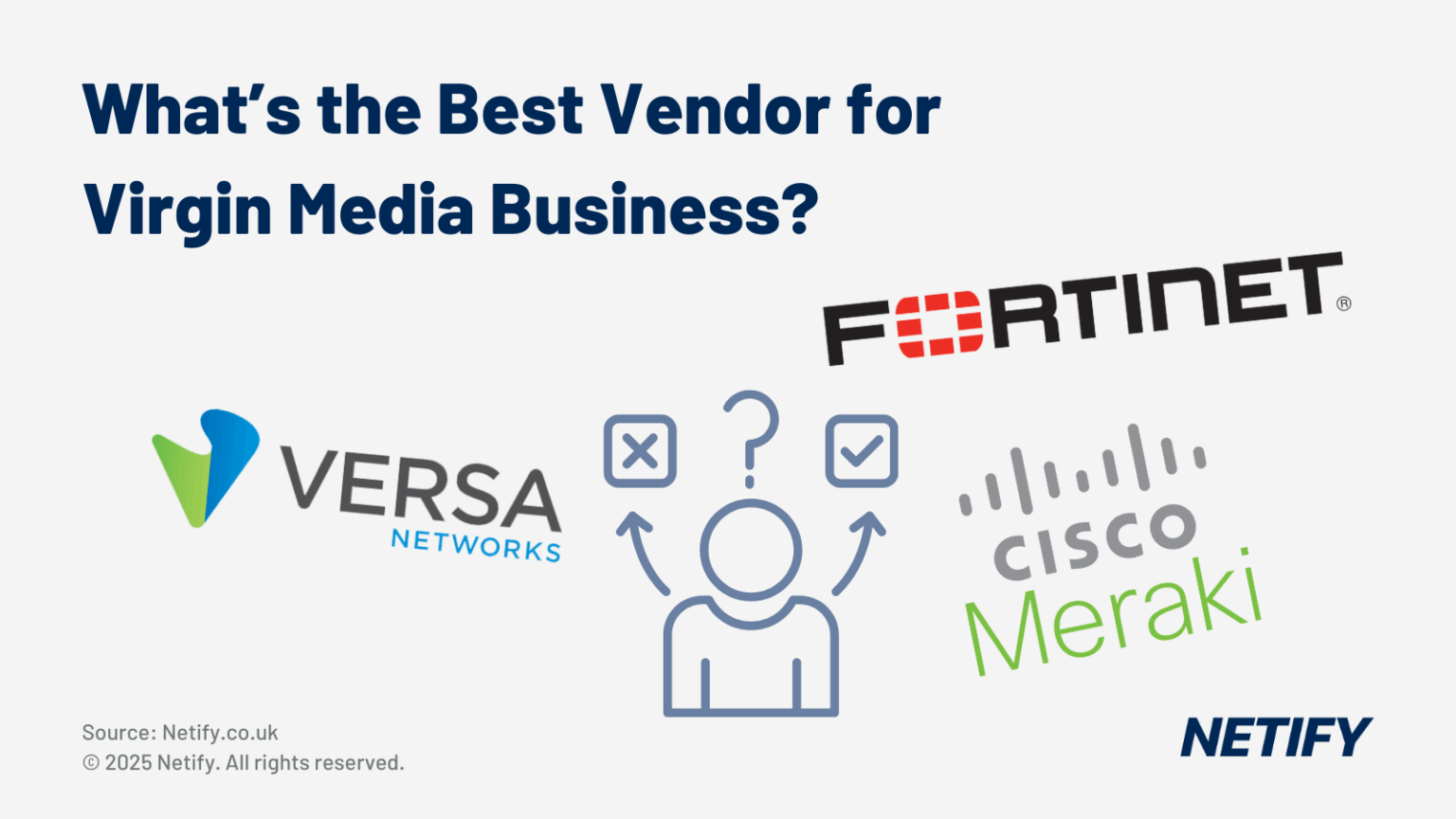
Here at Netify, we understand the difficulties that come with choosing the right SD-WAN vendor, particularly when trying to pair your underlay network services with a Software-Defined Wide Area Network (SD-WAN) solution. As both a partner of Virgin Media Business and an SD-WAN/SASE marketplace, we're uniquely positioned to offer genuinely unbiased advice without favouring specific solutions - this means you'll get straight-talking guidance free from technical jargon and vendor marketing speak.
We appreciate that different businesses have vastly different needs, and we're keen to help you find the right SD-WAN vendor for your specific situation. If you're unsure what that situation might be, don't worry – we're here to help you figure that out too.
One app to build and publish your personalised SD-WAN & SASE Network Security RFP with AI support
Over thirty curated SD-WAN & Network Security vendors & providers can respond directly to your RFP, get AI-scored comparisons, message instantly, book demos, provide proofs of concept, and supply global Internet connectivity pricing for a complete end-to-end business case.
Try our free RFP BuilderWhat Is Virgin Media Business SD-WAN and How Does It Work?
As with any SD-WAN solution, it is a wide area network architecture that uses a centralised platform to manage the network independently from the hardware – the benefit of utilising Virgin Media for this comes from their managed SD-WAN service and integrated underlay nature.
With traditional networking, it's like having minimally controlled road systems, with one road for your emails, another for video calls and another for file transfers. Each road is fixed and expensive to build, and in the event one gets too congested or breaks down, that traffic comes to a complete standstill. SD-WAN can dynamically route your business data across multiple paths (fibre, broadband, 4G/5G), choosing the best route in real-time based on what's available and what type of data you're sending. This means that during peak hours, rather than all traffic flooding your optimum route, less urgent traffic such as routine file backups can take the slower route, and that all-important video conference gets the best routing.
As per Virgin Media "end users are closer to the apps and data they need, your apps will perform better and the experience those end users have will dramatically improve as a result."
But what makes Virgin Media Business stand apart as a Service Provider?
Most providers will give you the roads (connectivity) and then leave you to figure out the traffic management (SD-WAN software) yourself. Virgin Media bundles both together into one integrated service and therefore alleviates many of the management burdens, with handling of both underlay and overlay all in one place - making it a much simpler choice both short and longer term than other SD-WAN providers, utilising a fully managed package model. This is fundamentally different from the traditional approach of buying internet connectivity from one provider and then trying to layer on SD-WAN software from another vendor - an approach that often leads to finger-pointing when things go wrong and complex technical integration challenges that can take months to resolve.
Why Would a Business Choose Virgin Media’s SD-WAN Architecture?
Whilst we've alluded to the benefits of a single point of contact for troubleshooting issues, Virgin Media SD-WAN can be advantageous for businesses of all sizes, each for their own reasons.
Regardless of size, some benefits are universal, with Virgin Media's SD-WAN providing unified visibility and control across your entire network, including each site and their individual network connections. To accommodate this, Virgin Media provides typical SD-WAN features such as path selection that automatically routes in real-time, routing critical applications over the fastest available connection whilst directing less urgent traffic via alternative paths. Built-in security features integrate directly with the network fabric, providing consistent protection without requiring separate security appliances at each location.
Which SD-WAN Vendors Partner With Virgin Media?
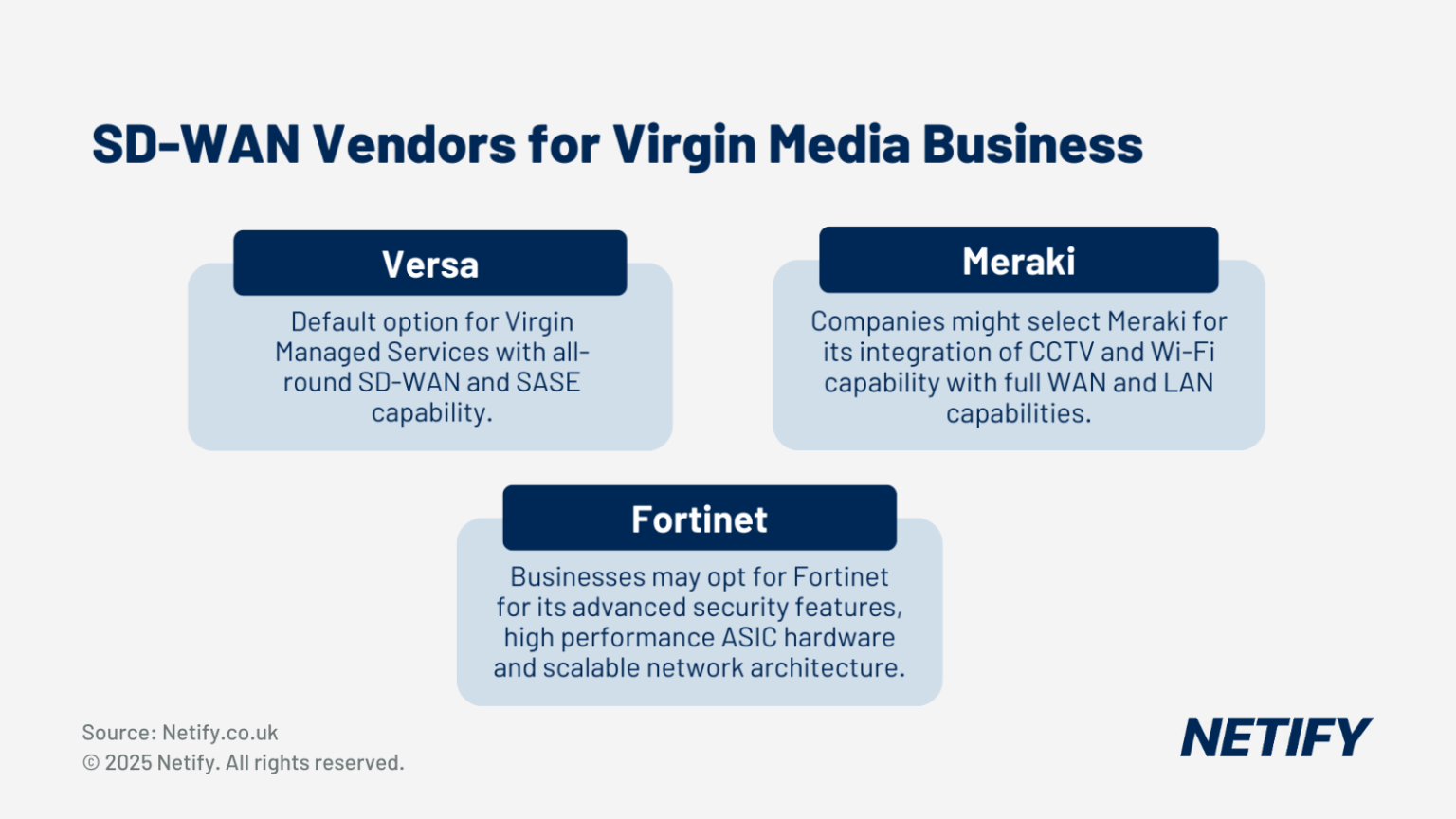
When considering Virgin Media’s UK connectivity, businesses will need to determine the most appropriate SD-WAN solution from Virgin Media's list of vendors. Whilst their primary partnership is with Versa Networks (launched in 2018 with Versa's Cloud IP platform), Virgin Media collaborates with industry-leading partners such as Cisco and Fortinet (wholesale offering) to enhance their SD-WAN offerings with additional functionalities, each bringing distinct strengths to the table. This curated selection means you won't be overwhelmed with endless options but rather can focus on solutions that are already optimised to work seamlessly with Virgin Media's infrastructure.
Each of Virgin Media's partner vendors excels in different areas, and the right choice will depend on factors such as your company size, industry requirements, existing technology stack and long-term business objectives. It's worth noting that while Versa Networks serves as Virgin Media's default managed SD-WAN partner (making it the natural starting point for many businesses), the other three vendors offer compelling alternatives depending on your specific use case.
Vendor Comparison
| Aspect | Versa Networks | Cisco Meraki | Fortinet | Position |
|---|---|---|---|---|
| Default | SD-WAN vendor for Virgin Media Business | Advanced network management with Umbrella integration | Most security-focused solution | Position |
| Primary Strengths | Multi-tenancy capabilities, Fully-managed solution, Easy Virgin infrastructure integration, Cost-effective for SMEs | Machine learning insights, Three-clicks-to-secure security services, Cisco Talos security backing, Ease of use | Advanced security features, Next-generation firewall, Automated WAN path control, Intrinsic security integration | |
| Best Use Cases | Large-scale operations, Multiple operational units, Quick branch deployment, SME to enterprise scalability | Hybrid cloud environments, Application performance monitoring, Multi-location businesses, Easy security management | Strict security requirements, Regulatory compliance needs, Extensive network environments, Critical application management | |
| Security Services | Integrated networking & security, Application-level visibility, Multi-service capabilities | Layer 7 firewall protection, Cisco AMP & DLP, Umbrella Secure Internet Gateway, ML-powered threat detection | Real-time threat protection, FortiGuard AI-powered services, Next-gen firewall capabilities, SSL inspection & antivirus | |
| Key Differentiators | Default Virgin partner, Cost-effective deployment, Integrated Virgin services, Multi-tenant architecture | ML-powered insights, Cisco ecosystem integration, User-friendly interface, Advanced analytics | Security-first approach, Real-time threat protection, Compliance-ready features, Unified security management | |
| Target Market | SME to large enterprise with Virgin integration focus | Businesses requiring advanced analytics and easy management | Organisations with stringent security and compliance requirements |
How Do I Decide Which Vendor Is Right for My Business?
Rather than getting overwhelmed by feature lists and technical specifications, we've developed a straightforward framework that helps you decide which vendor suits your business best.
What Are the Pros and Cons of Each Vendor?
Each SD-WAN provider's focus differs slightly, and this brings distinct advantages alongside certain limitations for Virgin Media customers that you should consider before making your decision.
Can I Mix Virgin Media SD-WAN With Other Connectivity Types?
Yes, and this flexibility is one of SD-WAN's greatest strengths. Virgin Media's SD-WAN solutions are designed to manage multiple network connectivity types simultaneously (MPLS, broadband, fibre and 4G/5G integrations).
So what does that mean for my existing infrastructure?
Rather than replace your entire network infrastructure, SD-WAN overlay can make the most of whatever existing infrastructure and connections you have available by continuously monitoring all available connections and directing traffic along the most appropriate path based on real-time conditions and application requirements - something that makes installation and future flexibility so much easier for Virgin Media Business customers.
But why might I need all of these connection types?
We'd suggest that, although broadband is typically a cheap option for many daily tasks, pairing it with other connectivity types can greatly benefit your business, not only for performance but also greater business continuity.
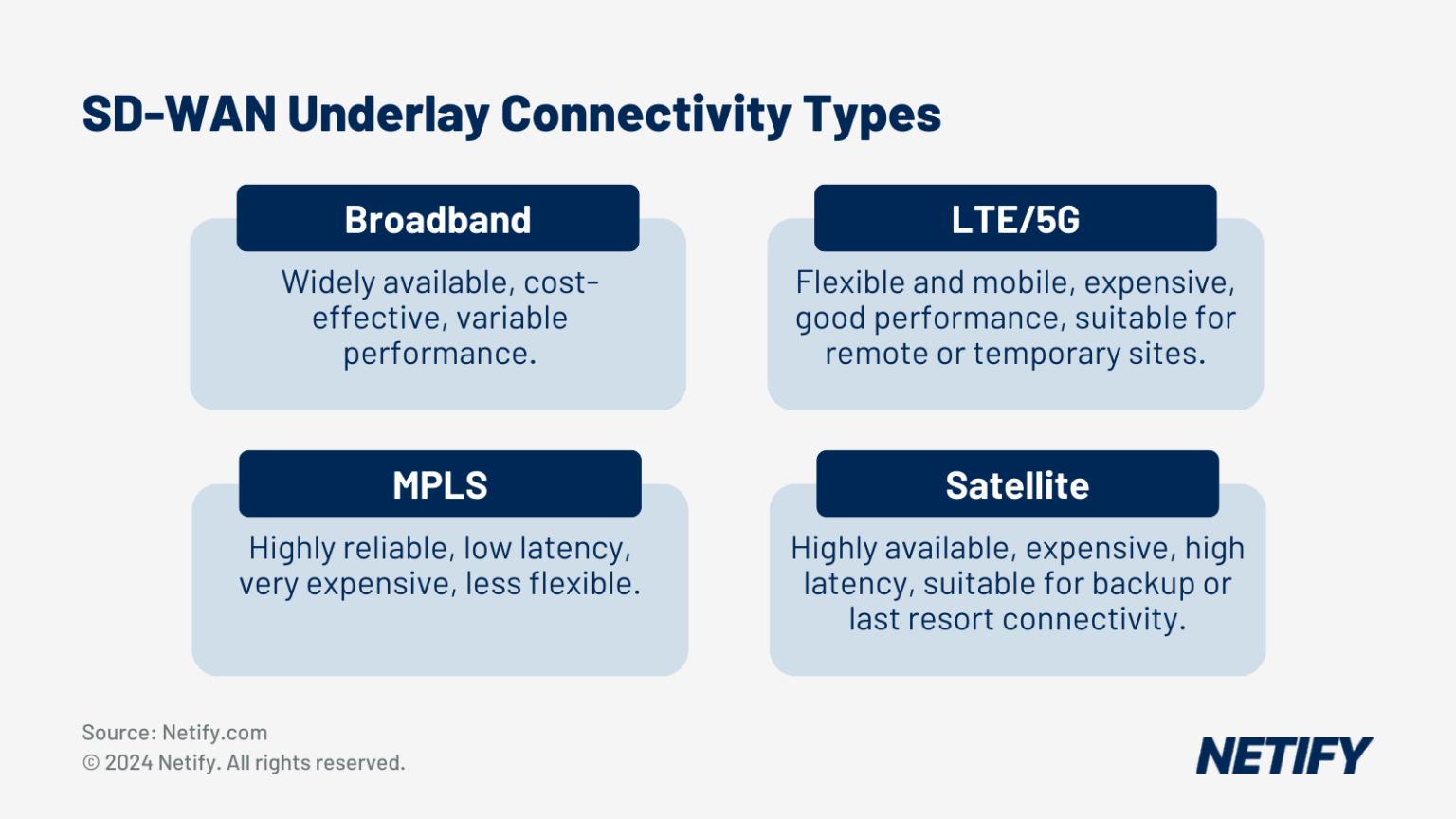
MPLS typically provides consistent latency and guaranteed bandwidth, making it ideal for voice calls and other real-time applications. Often we find that people ask if SD-WAN can replace MPLS, but we'd suggest that it's better to use them together, as SD-WAN can intelligently route your most critical traffic over MPLS whilst directing bulk data transfers or routine backups over more cost-effective broadband connections.
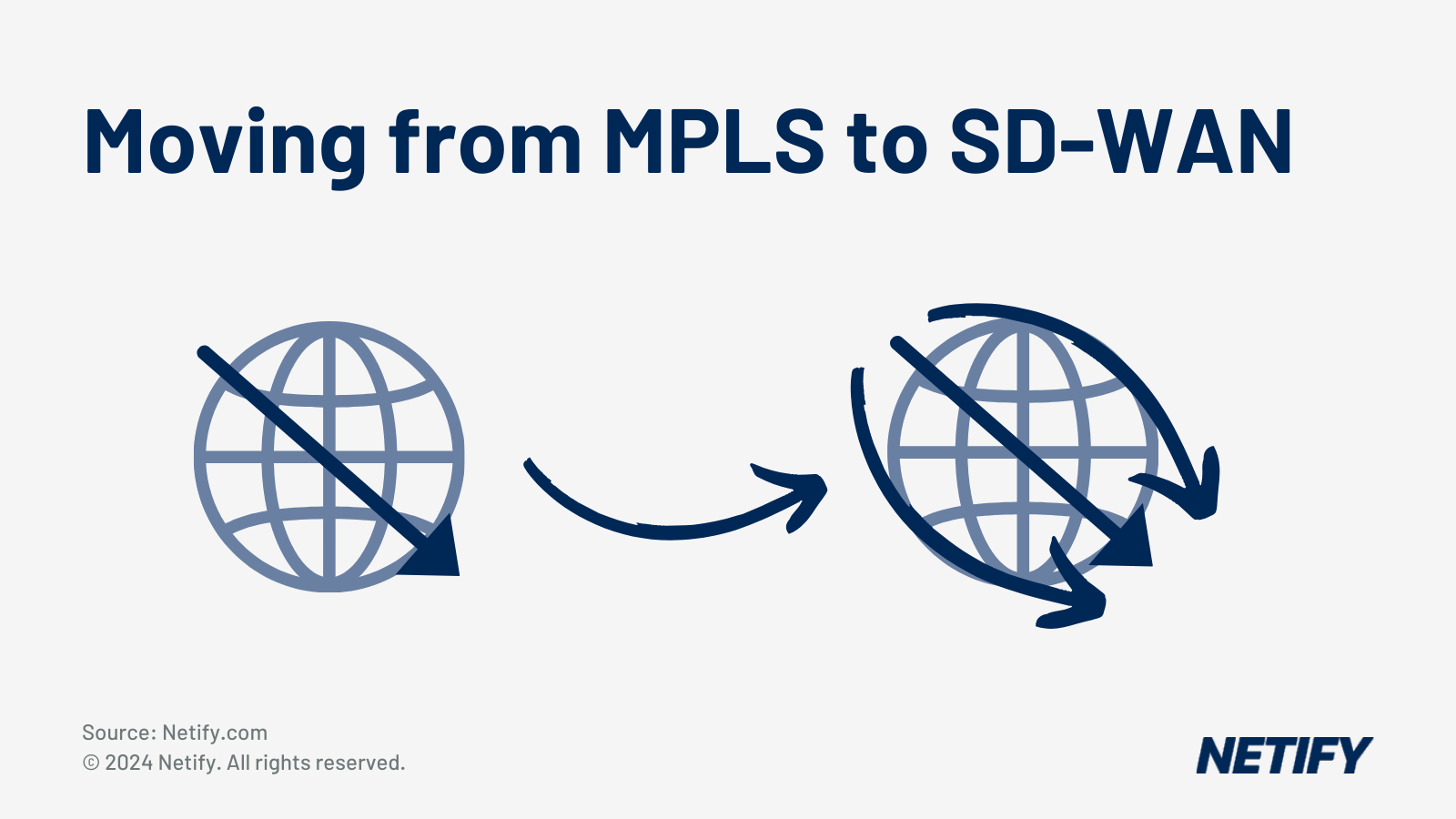
Related Post: What to consider when moving from MPLS to SD-WAN
Cellular connections serve multiple roles within an SD-WAN environment. They provide instant connectivity for new locations before fixed-line services are installed, offer backup connectivity when primary circuits fail, and can supplement bandwidth during peak usage periods. With 5G's improving speeds and reduced latency, mobile connectivity is becoming a viable primary connection type for many smaller locations.
Hybrid SD-WAN architecture allows complex networking decisions to be made automatically, without requiring manual intervention from your IT team. Multiple connections can be used simultaneously rather than sitting idle as pure backup links. A location with 100Mbps fibre and 50Mbps 4G can effectively have 150Mbps of available bandwidth during peak periods, with the SD-WAN system easily distributing load across both connections.
What Security Features Should I Expect In My SD-WAN Service?
Virgin Media's integrated approach means security features are built directly into their SD-WAN service rather than requiring you to source and manage separate security vendors. This single-provider model ensures consistent security policies across all your Virgin connectivity types - whether fibre, broadband, or 4G/5G - without the complexity of coordinating multiple security solutions. Regardless of your choice of Virgin Media-offered SD-WAN vendor, you can expect to see access to these security feature mainstays:
- Next-Generation Firewall (NGFW) – Application-aware filtering with deep packet inspection
- Intrusion Prevention System (IPS) – Real-time blocking of malicious network activity
- Threat Intelligence Feeds – Continuously updated threat databases
- Zero Trust Network Access (ZTNA) – Identity-based access controls for users and devices
- End-to-end Encryption (IPsec) – Securing data in transit across all network connections
As with each of the vendor offerings, security remains paramount, and so whilst each offers some level of security services, not all SD-WANs are built the same, and there are differences in how each vendor approaches their security.
How Each Vendor Approaches Enhanced Security

Versa Networks builds security directly into the SD-WAN fabric with application-level threat detection and consistent policy enforcement across all locations. Their integrated approach eliminates the need for separate security hardware whilst providing comprehensive malware detection and URL filtering.

Within Virgin's Smart Internet Access (SIA) service, Cisco Meraki's security operates as a fully integrated component rather than an add-on. The Meraki MX appliance works alongside Virgin's connectivity to provide the 'three-clicks-to-secure' experience, with Umbrella DNS-layer security that's pre-configured to work optimally with Virgin's network routing.

Fortinet provides enterprise-grade security through their Security Fabric ecosystem, featuring FortiGuard AI-powered services, SSL inspection without performance impact, and advanced compliance features like sandboxing and forensic logging.
Virgin Media's approach to SASE (Secure Access Service Edge) eliminates the typical challenge of integrating multiple security vendors with your chosen connectivity provider. Rather than coordinating between separate SASE vendors and connectivity providers, Virgin's partnerships ensure your security policies are designed around their specific network architecture and performance characteristics
Combining Secure Service Edge (SSE) capabilities such as Cloud Access Security Broker (CASB), Secure Web Gateway (SWG) and Zero Trust Network Architecture (ZTNA) into SD-WAN, this means security policies travel with your users and data regardless of location, providing consistent protection without VPNs or separate security software.
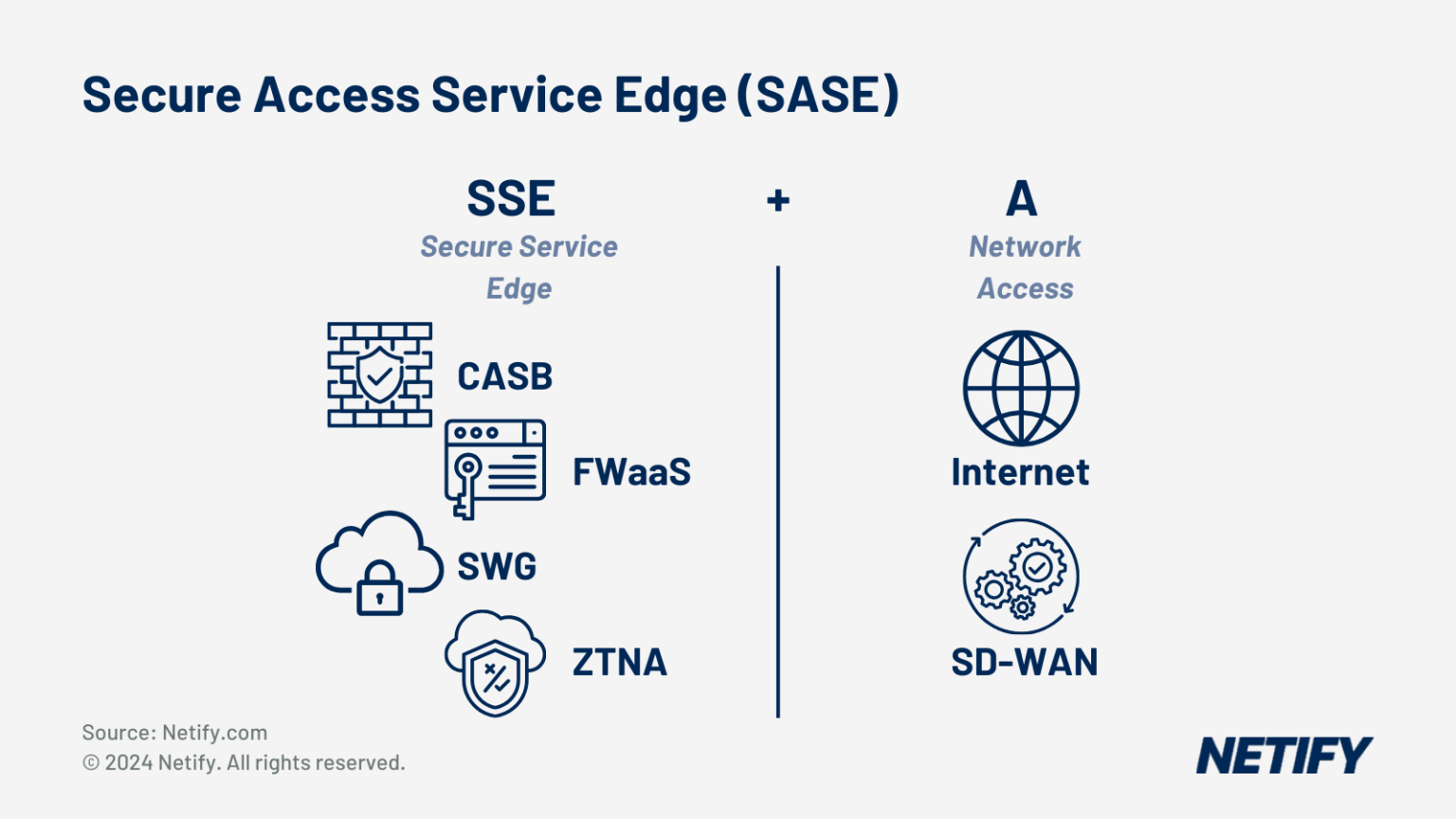
For businesses, this translates to simplified management, reduced complexity, and improved security posture across all access methods whilst eliminating multiple vendor relationships and reducing hardware requirements.
What Does the SD-WAN Deployment and Management Look Like?
One of the most common concerns we hear from businesses is about the complexity of implementing SD-WAN architecture. Fortunately, Virgin Media has not only simplified this process but has made it a timely one too. Virgin Media coordinates with your chosen vendor for a typical 2-6 week deployment. This involves remote site surveys, phased rollouts starting with a pilot location and template configurations that make additional sites operational within days. This means that Virgin Media Business customers can rest assured that connectivity is entirely handled whilst vendors configure the SD-WAN overlay and policies.
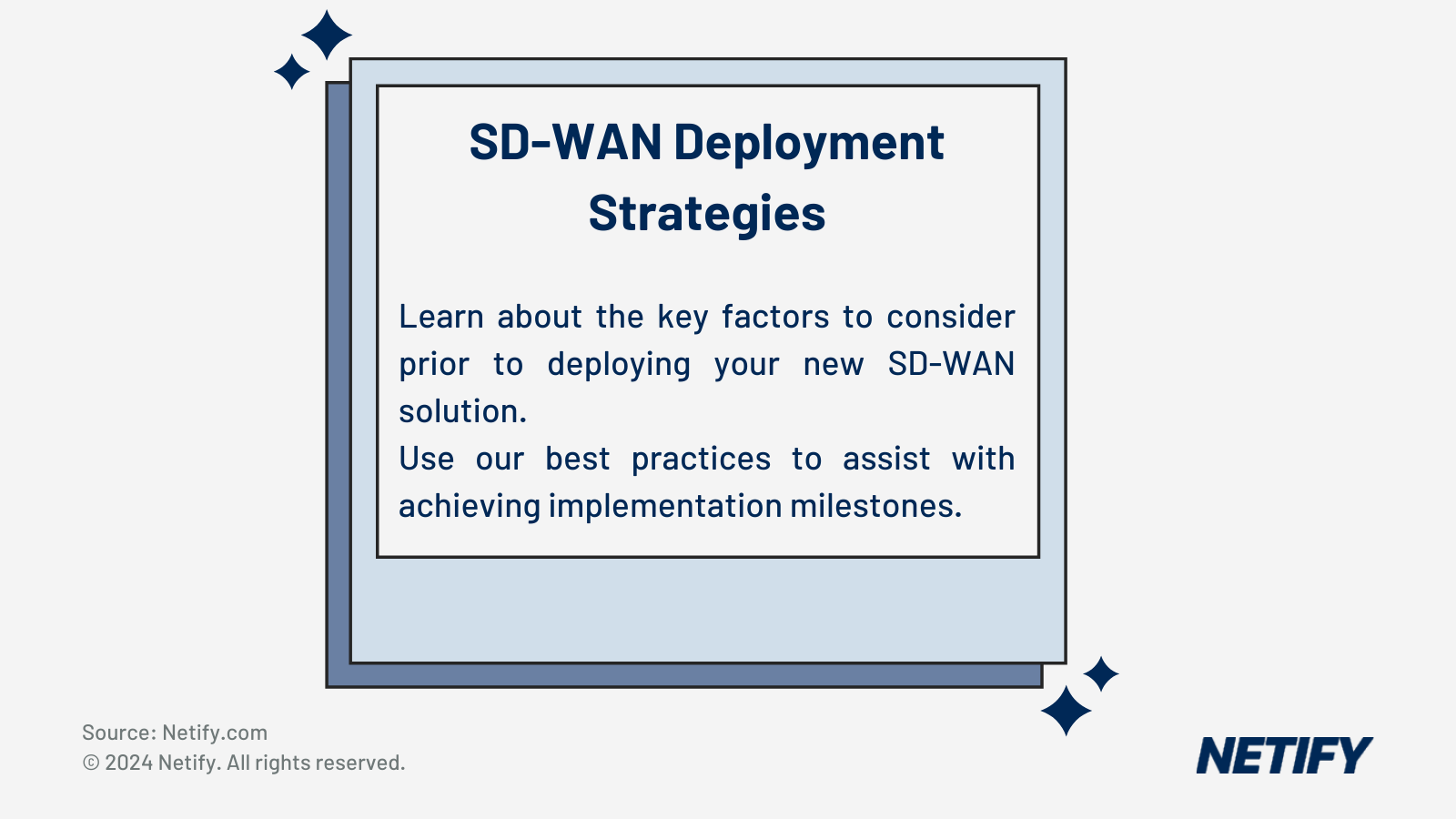
Related Post: SD-WAN Deployment Strategies
All vendors provide cloud-based dashboards for centralised control that simplifies network management. Policy changes deploy instantly across all locations without site visits (remote access), and most routine management takes under 30 minutes daily, with automatic failover and self-healing reducing emergency interventions. On top of this, those using more than one cloud service will appreciate this management portal's ability to manage multiple services in one space.
Vendor Management Differences
Versa Networks: Fully managed options available - they handle operations for you.
Cisco Meraki: Most intuitive interface with automated optimisation suggestions
Fortinet: More hands-on control, ideal for organisations with security expertise
Making an Informed Choice
Choosing the right SD-WAN vendor for your Virgin Media Business connection ultimately comes down to understanding your specific requirements and matching them to each vendor's strengths.
It's important to remember that the best vendor isn't determined by feature count or marketing promises but by how well the solution aligns with your operational needs, security requirements and budget constraints. Virgin Media's integrated approach means whichever vendor you choose, you'll benefit from simplified management, unified billing and coordinated support.

Harry holds a BSc (Hons) in Computer Science from the University of East Anglia and serves as a Cybersecurity Writer here at Netify, where he specialises in enterprise networking technologies. With expertise in Software-Defined Wide Area Networks (SD-WAN) and Secure Access Service Edge (SASE) architectures, Harry provides in-depth analysis of leading vendors and network solutions.
Fact-checked by: Robert Sturt - Managing Director, Netify
Build your SD-WAN RFP in minutes with AI assistance, invite 30+ curated vendors, receive structured responses aligned to each requirement, request connectivity pricing across every site, and message vendors directly - all inside Netify.


